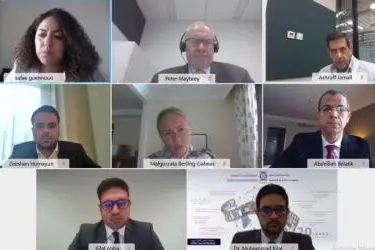PHOTO
Manama, Kingdom of Bahrain | The General Council for Islamic Banks and Financial Institutions (CIBAFI), the global umbrella of Islamic financial institutions, continues its annual meetings by organising a webinar on “Evolving Global Tax Landscape and Islamic Finance Industry” with PricewaterhouseCoopers (PwC) and the Online Launch of its 6th Global Islamic Bankers’ Survey (GIBS) Report on “Islamic Banking Sector: A Look into the Future”.
Today’s rapid changes in the international tax landscape are driven to address the unique challenges that arise from digitalization of the overall economy. With more and more banks going digital, the changes in the tax landscape would directly affect banks and financial institutions.
CIBAFI – PwC webinar hosted a line-up of financial services experts who discussed the critical changes in the international tax landscape which are of significant relevance to banks and financial institutions. The speakers highlighted the tax and transfer pricing implications for Islamic financing, the interplay between BEPS 2.0 and digital banking, and the importance of tax function for enterprises in the Middle East region and beyond.
From hosting an awareness sharing platform, CIBAFI Annual Meetings also witnessed the launch of CIBAFI’s 6th edition of its annual flagship publication - the Global Islamic Bankers’ Survey (GIBS) Report on “Islamic Banking Sector: A Look into the Future”. This edition presents a reflection on the Islamic banking industry and the evolving trends that will shape its future landscape. The report reflects the views and responses received from 100 heads of Islamic banks from 33 jurisdictions and features special articles by prominent industry leaders.
Commenting on the launch of the GIBS, CIBAFI Secretary General, Dr. Abdelilah Belatik said: “Research has an important role to play in providing guidance and shaping the way forward for the financial sector. This year’s GIBS edition is special as it coincides with the 20th Anniversary of CIBAFI. The current challenges that we are facing globally and in the industry increase the necessity to contemplate the future and identify the opportunities and actions needed for the industry to continue with its growth and development. Thus, the report highlights the outlook of the Islamic banking sector for ten years down the road and the factors that will affect the growth and the development of the industry. Together with the industry leaders who contributed to this special edition of the GIBS Report, we hope that this publication will provide a significant impact on the industry especially during this difficult situation.”
The analysis shows that banks are generally optimistic about the industry's future over the next ten years. There is, however, a recognition that in the areas where Islamic finance is well-established, it may be difficult for growth to exceed that of the general economy. Therefore, to sustain higher growth rates, the expansion will have to come from areas where Islamic finance is relatively new and from those where, despite a long-term presence and a predominantly Muslim population, it continues to represent a small proportion of the overall financial sector.
The experts who shared their insights on the factors that will affect the future landscape of the Islamic banking industry, during the online launch included: Prof. Dato’ Dr Mohd Azmi Omar, President & Chief Executive Officer, International Centre for Education in Islamic Finance (INCEIF), Malaysia; Mr. Ventje Rahardjo, Executive Director, National Committee of Islamic Economic and Finance, Indonesia; Mr. Mohammed Kateeb, Group Chairman & Chief Executive Officer, Path Solutions; Mr. Peter Casey, Consultant, General Council for Islamic Banks and Financial Institutions (CIBAFI); and Dr. Abdurrahman Yazici, Director of International Center for Islamic Economics and Finance (ICIEF/ULIFAM), Social Sciences University of Ankara (ASBU), Turkey
CIBAFI supports the Islamic financial services industry through various activities and initiatives, including providing industry stakeholders with a platform to discuss emerging issues, represent the industry at major global financial events, and share knowledge through specialized publications and comprehensive training programmes.
-Ends-
About the General Council for Islamic Banks and Financial Institutions (CIBAFI):
CIBAFI is an international non-profit organisation established in 2001 and headquartered in the Kingdom of Bahrain. CIBAFI is affiliated with the Organisation of Islamic Cooperation (OIC). It represents the Islamic financial services industry globally, defending and promoting its role, consolidating co-operation among its members, and with other institutions with similar interests and objectives. CIBAFI has over 130 members from 34 jurisdictions, representing market players, international intergovernmental organizations and professional firms, and industry associations.
For more information about CIBAFI, please visit www.cibafi.org
Tel: +973 17357300 Email: media@cibafi.org
© Press Release 2021
Disclaimer: The contents of this press release was provided from an external third party provider. This website is not responsible for, and does not control, such external content. This content is provided on an “as is” and “as available” basis and has not been edited in any way. Neither this website nor our affiliates guarantee the accuracy of or endorse the views or opinions expressed in this press release.
The press release is provided for informational purposes only. The content does not provide tax, legal or investment advice or opinion regarding the suitability, value or profitability of any particular security, portfolio or investment strategy. Neither this website nor our affiliates shall be liable for any errors or inaccuracies in the content, or for any actions taken by you in reliance thereon. You expressly agree that your use of the information within this article is at your sole risk.
To the fullest extent permitted by applicable law, this website, its parent company, its subsidiaries, its affiliates and the respective shareholders, directors, officers, employees, agents, advertisers, content providers and licensors will not be liable (jointly or severally) to you for any direct, indirect, consequential, special, incidental, punitive or exemplary damages, including without limitation, lost profits, lost savings and lost revenues, whether in negligence, tort, contract or any other theory of liability, even if the parties have been advised of the possibility or could have foreseen any such damages.




















